|
|
|
Sort Order |
|
|
|
Items / Page
|
|
|
|
|
|
|
| Srl | Item |
| 1 |
ID:
181860
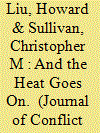

|
|
|
|
|
| Summary/Abstract |
Among security institutions, police occupy a unique position. In addition to specializing in the repression of dissent, police monitor society and enforce order. Yet within research studying state repression, how police institutions are used and deployed to control domestic threats remain under-explored, particularly as it relates to the dual functionality just described. In this study, we develop and test an explanation of police repression accounting for the bifurcation of Mann’s two modalities of state power: infrastructural power and despotic power. Infrastructural power allocates police resources to surveil dissidents and preemptively limit dissent’s emergence or escalation. Police deploy despotic power through repressive responses to political threats. Empirically, we employ unique data to investigate police repression and the modalities of power in Guatemala. To analyze how shifting the balance between infrastructural and despotic power affects police repression, we isolate damage occurring from an earthquake that exogenously reshaped the landscape of infrastructural power. Results affirm the role of infrastructural power in regulating the despotic power of the state. Where local infrastructure was most affected by the earthquake, the security apparatus lost the capacity to surveil nascent movements and predict their activity, thereby providing opportunity for dissidents to mobilize and forcing police to (over-)react rather than shutdown resistance preemptively. However, the intensity of state violence recedes as the state recovers from the infrastructural damage and regains its control of local district.
|
|
|
|
|
|
|
|
|
|
|
|
|
|
|
|
| 2 |
ID:
181864
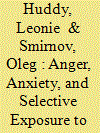

|
|
|
|
|
| Summary/Abstract |
We examine the political consequence of exposure to widely available video content of terror violence. In a two-wave survey of Americans, we assess who is exposed to, and seeks out, terror-related video content in the first wave and then observe who decides to watch raw video footage of the Boston marathon terror attack in the second. We focus centrally on anxiety and anger as differing emotional reactions to the threat of terrorism and document their influence on exposure to terror violence. Anxiety generates avoidance of violent terror content whereas anger increases its consumption. Moreover, we find that anger increases exposure to violent terror content and in addition enhances support for punitive and retaliatory anti-terrorism policy. We discuss the implications of our findings for the broader dynamics of terrorist violence and the emotional basis of selective news exposure.
|
|
|
|
|
|
|
|
|
|
|
|
|
|
|
|
| 3 |
ID:
181861
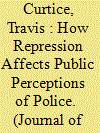

|
|
|
|
|
| Summary/Abstract |
What are the effects of state repression on public perceptions of police? And to what extent are these effects uniform or conditional on individuals’ loyalty to political authorities? I argue that repression by the police negatively affects how people evaluate the police, especially among those who do not support the ruling party. People who oppose the regime are more likely to fear the police following a repressive event relative to regime supporters. To test this argument, I leverage a unique research design opportunity that emerges from the social media tax protest led by Robert Kyagulanyi Ssentamu (also known as Bobi Wine) and subsequent selective repression by the Uganda Police Force while a nationally representative survey on police and security was being administered in Uganda. I demonstrate selective repression of protesters decreased support for the police. These effects are largely driven by political loyalty; repression has a stronger effect on how members of the opposition evaluate the police relative to incumbent supporters.
|
|
|
|
|
|
|
|
|
|
|
|
|
|
|
|
| 4 |
ID:
181859
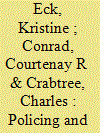

|
|
|
|
|
| Summary/Abstract |
The police are often key actors in conflict processes, yet there is little research on their role in the production of political violence. Previous research provides us with a limited understanding of the part the police play in preventing or mitigating the onset or escalation of conflict, in patterns of repression and resistance during conflict, and in the durability of peace after conflicts are resolved. By unpacking the role of state security actors and asking how the state assigns tasks among them—as well as the consequences of these decisions—we generate new research paths for scholars of conflict and policing. We review existing research in the field, highlighting recent findings, including those from the articles in this special issue. We conclude by arguing that the fields of policing and conflict research have much to gain from each other and by discussing future directions for policing research in conflict studies.
|
|
|
|
|
|
|
|
|
|
|
|
|
|
|
|
| 5 |
ID:
181862
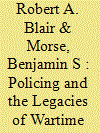

|
|
|
|
|
| Summary/Abstract |
How does violence during civil war shape citizens’ willingness to trust and rely on state security providers in the post-conflict period? Can post-conflict security sector reform restore perceptions of state security forces among victims of wartime state predation? Using a survey and field experiment in Liberia, we show that rebel-perpetrated violence is strongly positively correlated with trust and reliance on the police after conflict is over, while state-perpetrated violence is not. Victims of wartime state predation are, however, more likely to update their priors about the police in response to positive interactions with newly reformed police officers. We also show that abuses committed by police officers in the post-conflict period are negatively correlated with citizens’ perceptions of the police, potentially counteracting the positive effects of security sector reform. We corroborate our quantitative findings with detailed qualitative observations of interactions between civilians and police officers in the field.
|
|
|
|
|
|
|
|
|
|
|
|
|
|
|
|
| 6 |
ID:
181863


|
|
|
|
|
| Summary/Abstract |
How do policing institutions affect the prospects for peace in post-conflict settings? We present a principal-agent theoretical framework to explain how the institutional design of policing affects the recurrence of civil conflict. We argue that the fragmentation of police forces can reignite conflict dynamics by impeding coordinated action, undermining information sharing, and enabling agents to pursue their own interests. We test these expectations with the Police Force Organization Dataset (PFOD) on police forces in over 100 developing states. Our empirical analyses show that increasing the number of distinct police forces is systematically associated with an increased risk of conflict recurrence in post-conflict states. We also find that a larger number of police forces is associated with more abuse against civilian populations in post-conflict states, setting the stage for new grievances that may undermine peace.
|
|
|
|
|
|
|
|
|
|
|
|
|
|
|
|
| 7 |
ID:
181866
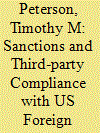

|
|
|
|
|
| Summary/Abstract |
Ostensibly bilateral US foreign policy actions, such as sanctions, can influence third-party compliance with US policy preferences. US sanctions simultaneously signal US preferences and demonstrate leverage, which can motivate third parties to avoid or change proscribed behavior proactively. Empirical testing of this strategic behavior typically is difficult given that it predicts non-events in a noisy signaling environment. However, I argue that the global trade of dual-use commodities—those with both civilian and military purposes—is a phenomenon where we can observe this process systematically. I isolate US sanctions that provide relevant context both by stigmatizing the target and signaling that third-party dual-use exports to the target would directly undermine US policy goals. Using newly-coded bilateral data spanning the post-Cold War period, I find evidence that relevant US sanctions are associated with lower third-party dual-use exports to US-sanctioned states. My findings have implications for scholars and policy-makers, suggesting a broad yet shrouded ability of sanctions to advance US foreign policy goals.
|
|
|
|
|
|
|
|
|
|
|
|
|
|
|
|
| 8 |
ID:
181865


|
|
|
|
|
| Summary/Abstract |
What is the legacy of war, violence, and displacement on altruism toward diverse populations suffering similar hardships today? Prior research suggests these hardships have the potential to increase empathy that can in turn motivate altruism across identity boundaries. We test this hypothesis using survey data collected in 2017 from over 2,000 Syrians living in rebel-held regions where many internally displaced persons (IDPs) sought refuge. We find that Syrians previously exposed to violence were more likely to host IDPs. Using a conjoint experiment to measure hosting preferences over different types of IDPs, we show that these individuals also preferred to host sick and vulnerable IDPs and outgroup IDPs from the Kurdish ethnic minority. However, they were less likely to host IDPs from the Christian minority, possibly due to their association with the government. These results suggest that empathy and politics both play an important role in shaping the relationship between violence, altruism, and intergroup behavior during conflict.
|
|
|
|
|
|
|
|
|
|
|
|
|
|
|
|
|
|
|
|
|